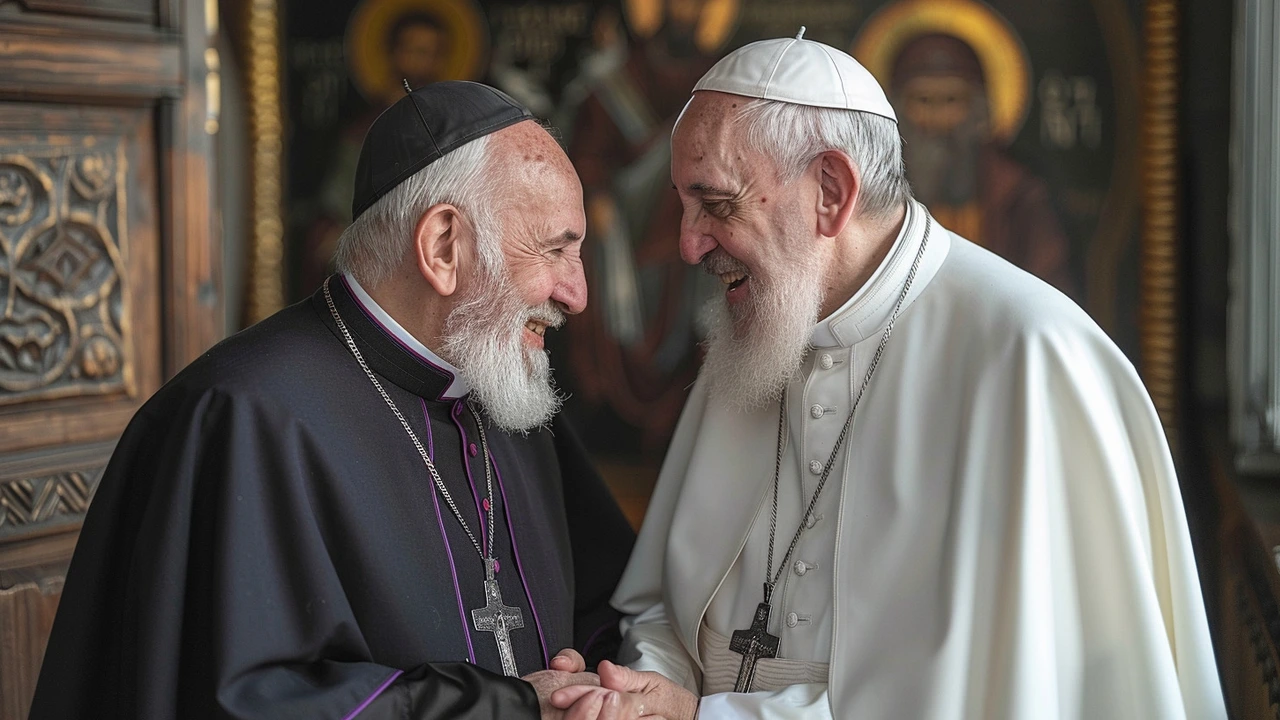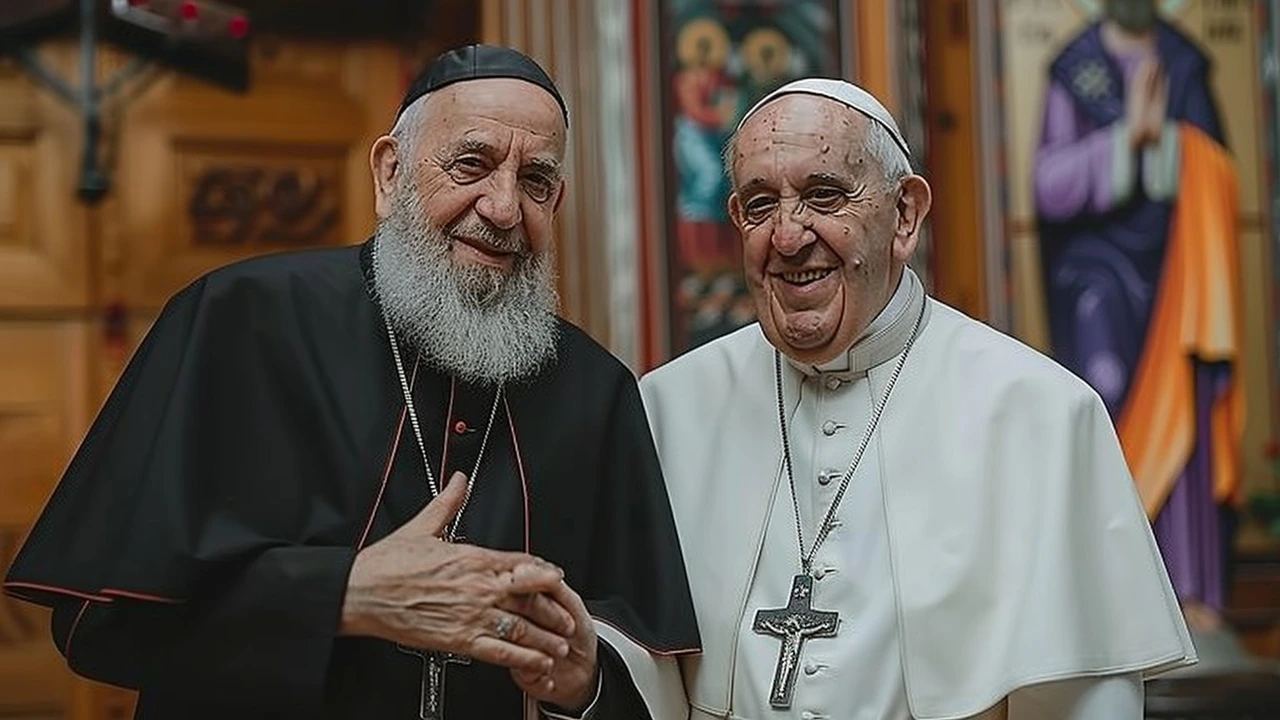Aram I and Pope Francis Engage in Crucial Talks on Ecumenical Relations and Human Rights
In an important and highly anticipated meeting, His Holiness Catholicos Aram I of the Great House of Cilicia met with His Holiness Pope Francis at the Vatican. The agenda was filled with pressing global issues, emphasizing the growing need for unity among Christian denominations, the imperative of addressing human rights violations, and fostering interfaith understanding amid ongoing political crises.
One of the central topics of their discussion was the necessity to transform ecumenical relations into a more substantive and partnership-oriented approach. Aram I and Pope Francis discussed the idea of establishing a common date for celebrating the Holy Resurrection, a move that could symbolize Christian unity globally. By converging on such an important religious observance, both leaders believe it could serve as a powerful gesture of solidarity and cooperation among various Christian denominations.
The idea of convening a Third Vatican Council with active participation from non-Catholic churches was also brought to the table. Such a council would aim to address the challenges of the modern world and meet the spiritual needs of all Christians, regardless of their denominational background. It would mark a historic step towards inclusivity and collective action within the global Christian community.

Human Rights in Focus: The Plight of Armenian POWs
Beyond religious unity, the meeting took a poignant turn as Pope Francis emphasized the deplorable plight of Armenian political prisoners of war currently held in Azerbaijan. Following the tragic conflict in Nagorno-Karabakh, these prisoners have been the subject of international concern and human rights advocacy. Pope Francis unequivocally called for their immediate release, stressing the necessity for international pressure and intervention to ensure their return home safely.
An equally critical issue was the required return of indigenous Artsakh Armenians to their homeland under the umbrella of international protection. Pope Francis highlighted the importance of restoring these displaced individuals to their rightful homes in a secure and dignified manner. This aligns with the broader call he made in February, urging for prayers and support for those fleeing Nagorno-Karabakh and the displaced families seeking refuge. The Pope's consistent advocacy underscores the humanitarian aspect of this ongoing conflict and the global responsibility to aid and protect those affected.
Strengthening Christian-Muslim Coexistence in Lebanon
The conversation between Aram I and Pope Francis also touched on the importance of enhancing Christian-Muslim coexistence in Lebanon, a country known for its rich yet delicate tapestry of religious and ethnic communities. They deliberated on strategies to foster mutual respect and cooperation among Lebanon's diverse religious groups. Given Lebanon's strategic and symbolic importance in the Middle East, promoting peaceful coexistence can set a precedent for interfaith harmony in the region.
The complex political landscape of Lebanon was not overlooked. Aram I and Pope Francis discussed the critical need for a timely and just election of a president in Lebanon. This political stability is seen as fundamentally linked to the broader goals of religious coexistence and national unity. Both leaders agreed that the election process should be transparent and inclusive, ensuring that the voices of all Lebanese people are heard and respected.
A Historic Meeting with Far-reaching Implications
This meeting between Aram I and Pope Francis is more than a dialogue; it represents a momentous step towards addressing some of the world's most urgent moral and humanitarian issues. By reaffirming their commitment to ecumenical unity, advocating for human rights, and promoting interfaith harmony, these leaders are setting a powerful example for both religious communities and global policymakers.
The significance of such high-level discussions cannot be overstated. They serve as a reminder of the influential role religious leaders can play in humanitarian advocacy and international diplomacy. In a world often divided by conflict and intolerance, this meeting stands as a beacon of hope for inclusive, progressive, and compassionate action.

Matt Heitz
June 13, 2024 AT 17:52It's absolutely absurd that world leaders keep doling out vague platitudes while the real issue-global moral decay-gets ignored. The Vatican's soft‑power can’t mask the fact that sacred institutions are complicit when they bow to secular geopolitical games. You hear talk of "ecumenical unity," but without a firm stance against cultural infiltration, it's just a prayer for the status quo. If we truly care about preserving authentic Christian heritage, we need to draw a hard line now, not waste time on symbolic dates.
Susan Mark
June 13, 2024 AT 18:25Interesting take, but I think there's room for optimism here. The joint effort between the Pope and the Catholicos actually builds a bridge we haven't seen in decades, especially for displaced Armenian families. While structural reforms are essential, the symbolic gestures-like a shared Resurrection celebration-can galvanize grassroots support across denominations. It's a pragmatic step that respects tradition while acknowledging today's humanitarian needs.
Jason Jennings
June 13, 2024 AT 18:58Well, that's just another fancy PR stunt, if you ask me. All that talk about councils and dates sounds great on paper, but nobody's going to change the real power dynamics without a solid agenda. Pretending that a meeting equals progress just feeds the elite narrative that they're "doing something." Meanwhile, the actual victims keep waiting for real action.
Diego Vargas
June 13, 2024 AT 19:32actually, the idea of a third vatican council isnt new; it was floated back in the early 2000s by some theologians who wanted more inclusivity. but the real challenge is getting non‑catholic churches to feel they have a seat at the table without feeling like they're being subsumed. historically, councils have been dominated by the roman hierarchy, so breaking that pattern would require a radical re‑thinking of authority structures. it also means redefining what "catholic" even means in a broader ecumenical sense.
James Lawyer
June 13, 2024 AT 20:05From a jurisprudential perspective, the emphasis on the immediate release of Armenian POWs aligns with established international humanitarian law, specifically the Geneva Conventions' provisions on the treatment of prisoners of war. Moreover, the call for protective measures for displaced Artsakh Armenians underscores the principle of non‑refoulement, which obliges states to refrain from returning individuals to territories where they face serious threats. The Vatican's moral authority can therefore be leveraged to galvanize diplomatic pressure, provided that the advocacy is coupled with concrete legal mechanisms and multilateral engagement.
Abby Culbertson
June 13, 2024 AT 20:38i get the feeling this meeting is just talk and no real help for the families who need it now.
Alex Lee
June 13, 2024 AT 21:12It sounds like a waste of time.
Vida Yamini
June 13, 2024 AT 21:45While we can celebrate the diplomatic choreography of this historic encounter, it's crucial to recognize the deeper layers of significance that extend far beyond ceremonial optics. First, the joint declaration on a unified Resurrection date offers a tangible point of convergence for millions of believers, effectively creating a shared liturgical anchor that can foster mutual respect across denominational lines. Second, the proposal for a Third Vatican Council, inclusive of non‑Catholic voices, represents a groundbreaking shift toward participatory ecclesiology, challenging centuries‑old hierarchies and demanding a re‑evaluation of doctrinal development processes. Third, the Pope’s unequivocal stance on the release of Armenian POWs injects moral urgency into an otherwise stalled diplomatic arena, leveraging the Holy See’s soft power to mobilize international actors and civil society alike. Fourth, the emphasis on returning displaced Artsakh Armenians under international protection highlights the intersection of humanitarian law and religious responsibility, reminding us that faith leaders can act as catalysts for enforcing the principles of non‑refoulement and safe‑return. Fifth, the dialogue on Lebanese inter‑faith coexistence underscores the strategic importance of Lebanon as a microcosm of broader Middle Eastern sectarian dynamics, where successful models of Christian‑Muslim collaboration could ripple outward to neighboring states. Sixth, the call for a transparent and inclusive presidential election in Lebanon connects political stability with religious harmony, suggesting that equitable governance is a prerequisite for sustainable inter‑religious dialogue. Seventh, the acknowledgment of the human cost of conflict, through prayers for victims and displaced families, re‑centers the conversation on compassion rather than geopolitics alone. Eighth, by framing these issues within a moral narrative, the leaders reinforce the idea that ethical imperatives can and should guide diplomatic negotiations. Ninth, the public nature of this meeting serves as a reminder that religious institutions possess a unique capacity to convene disparate parties in pursuit of common humanitarian goals. Tenth, the ongoing discourse invites scholars, activists, and ordinary believers alike to engage critically with the evolving landscape of ecumenical partnership, ensuring that the momentum generated does not dissipate. In sum, this gathering is not merely a symbolic gesture-it is a multifaceted platform that, if nurtured, could reshape the contours of global religious cooperation, human rights advocacy, and peacebuilding for generations to come.